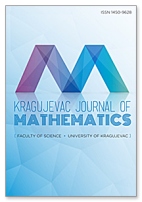On the Laplacian Coefficients of Trees
 Download PDF
Download PDF
Authors: A. GHALAV AND A. R. ASHRAFI
DOI: 10.46793/KgJMat2506.847G
Abstract:
Let G be a finite simple graph with Laplacian polynomial ψ(G,λ) = ∑ k=0n(−1)n−kck(G)λk. In an earlier paper, we computed the coefficient of cn−4 for trees with respect to some degree-based graph invariant. The aim of this paper is to continue this work by giving an exact formula for the coefficient cn−5 in the polynomial ψ(G,λ). As a consequence of this work, the Laplacian coefficients cn−k, k = 2, 3, 4, 5, for some know trees were computed.
Keywords:
Laplacian coefficient, k−matching, subdivision graph, tree.
References:
[1] A. R. Ashrafi, M. Eliasi and A. Ghalavand, Laplacian coefficients and Zagreb indices of trees, Linear Multilinear Algebra 67(9) (2019), 1736–1749. https://doi.org/10.1080/03081087.2018.1469599
[2] A. Ghalavand and A. R. Ashrafi, Laplacian coefficients of trees, Rad Hrvat. Akad. Znan. Umjet. Mat. Znan. 24(542) (2020), 1–14. https://doi.org/10.21857/m16wjcev89
[3] K. C. Das, A. Ghalavand and A. R. Ashrafi, On the number of k-matchings in graphs, Proceedings of the National Academy of Sciences, India Section A: Physical Sciences 92(4) (2022), 563–570. https://doi.org/10.1007/s40010-022-00771-2.
[4] C. D. Godsil and I. Gutman, On the theory of the matching polynomial, J. Graph Theory 5 (1981), 137–144. https://doi.org/10.1002/jgt.3190050203
[5] B. Furtula and I. Gutman, A forgotten topological index, J. Math. Chem. 53 (2015), 1184–1190. https://doi.org/10.1007/s10910-015-0480-z
[6] I. Gutman and N. Trinajstić, Graph theory and molecular orbitals. Total π-electron energy of alternant hydrocarbons, Chem. Phys. Lett. 17 (1972), 535–538. https://doi.org/10.1016/0009-2614(72)85099-1
[7] I. Gutman and K. C. Das, The first Zagreb index 30 years after, MATCH Commun. Math. Comput. Chem. 50 (2004), 83–92.
[8] I. Gutman, E. Milovanović and I. Milovanović, Beyond the Zagreb indices, AKCE Int. J. Graphs Comb. 17(1) (2020), 74–85. https://doi.org/10.1016/j.akcej.2018.05.002
[9] F. Harary and A. J. Schwenk, The number of caterpillars, Discrete Mathematics 6(4) (1973), 359–365. https://doi.org/10.1016/0012-365X(73)90067-8
[10] S. A. Hosseini, M. B. Ahmadi and I. Gutman, Kragujevac trees with minimal atom-bond connectivity index, MATCH Commun. Math. Comput. Chem. 71 (2014), 5–20.
[11] A. Milićević, S. Nikolić and N. Trinajstić, On reformulated Zagreb indices, Molecular Diversity 8 (2004), 393–399. https://doi.org/10.1023/B:MODI.0000047504.14261.2a
[12] R. Merris, A survey of graph Laplacians, Linear Multilinear Algebra 39 (1995), 19–31. https://doi.org/10.1080/03081089508818377
[13] B. Mohar, The Laplacian spectrum of graphs, in: Y. Alavi, G. Chartrand, O. R. Ollermann, A. J. Schwenk (Eds.), Graph Theory, Combinatorics, and Applications, Wiley, New York, 1991, 871–898.
[14] S. Nikolić, G. Kovačević, A. Milićević and N. Trinajstić, The Zagreb indices 30 years after, Croat. Chem. Acta 76(2) (2003), 113–124.
[15] C. S. Oliveira, N. M. M. de Abreu and S. Jurkewicz, The characteristic polynomial of the Laplacian of graphs in (a,b)-linear classes, Linear Algebra Appl. 356 (2002), 113–121. https://doi.org/10.1016/S0024-3795(02)00357-9
[16] W. Yan and Y.-N. Yeh, Connections between Wiener index and matchings, J. Math. Chem. 39 (2006), 389–399. https://doi.org/10.1007/s10910-005-9026-0
[17] S. Zhang and H. Zhang, Unicyclic graphs with the first three smallest and largest first general Zagreb index, MATCH Commun. Math. Comput. Chem. 55(2) (2006), 427–438.
[18] B. Zhou and I. Gutman, A connection between ordinary and Laplacian spectra of bipartite graphs, Linear Multilinear Algebra 56(3) (2008), 305–310. https://doi.org/10.1080/03081080601002254
